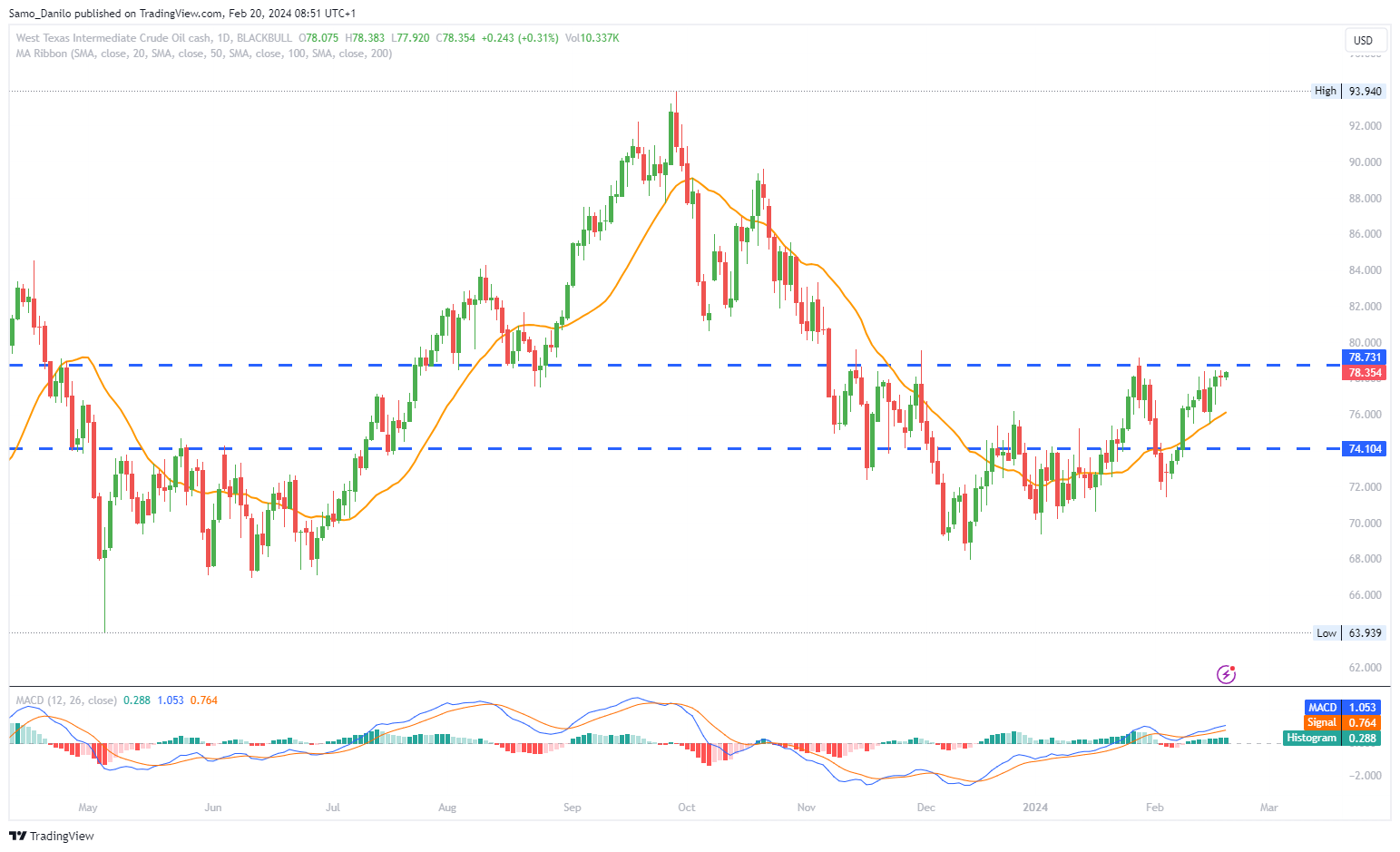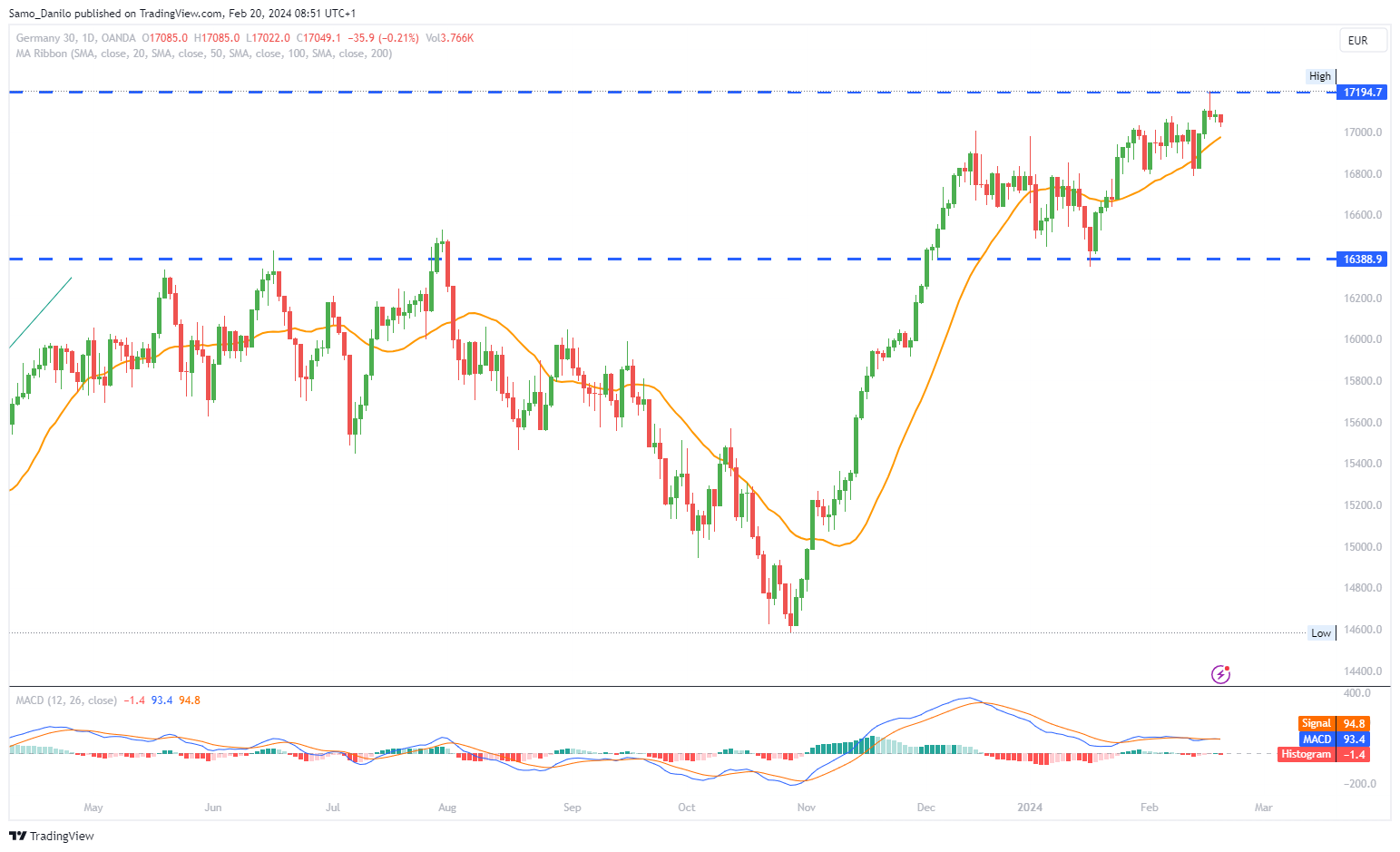EURUSD
- EUR/USD is currently holding lower ground and heading toward the 1.0750 level in early European trading on Tuesday. The pair appears to be in a tight range, possibly influenced by the absence of major economic events and the closure of the US and Canadian markets due to local holidays.
- The Euro's performance remains subdued, and the release of the Buba Monthly Report by the German Deutsche Bundesbank adds to the bearish sentiment. The report suggests that the German economy is likely in a recession, citing weak external demand, muted consumption, and cautious investments as contributing factors
- The macroeconomic calendar is light for the day, with only the Eurozone unveiling December Construction Output. In the absence of major economic indicators, market movements may be more subdued.
- The Federal Open Market Committee (FOMC) is set to publish the latest meeting minutes next Wednesday. This event is highlighted as more relevant, indicating that market participants are likely awaiting insights from the FOMC regarding its views on the economy and monetary policy.
- Traders and investors are focusing on the upcoming FOMC meeting minutes as a potential catalyst for market movement. The Euro's performance is currently influenced by concerns about the German economy and the broader Eurozone.
Closing statement: EUR/USD is currently in a tight range with a bearish bias, influenced by factors such as the German economic concerns and the lack of major economic events on the calendar. Traders are keeping an eye on the upcoming FOMC meeting minutes for potential insights that could impact the pair's direction. The overall sentiment appears cautious, with a focus on key economic developments.
GBPUSD
- GBP/USD is currently trading in negative territory and remains below the 1.2600 level in the European morning on Tuesday. The pair appears to be facing bearish pressure.
- San Francisco Federal Reserve President Mary C. Daly has mentioned that three rate cuts are a reasonable baseline for 2024. This suggests a dovish stance from a Fed official, possibly influencing the US Dollar's performance.
- St. Louis Federal Reserve President James Bullard has suggested that the Federal Reserve should consider lowering interest rates at its March meeting. Such remarks could impact the outlook for the US Dollar.
- The Bank of England (BoE) is expected to maintain interest rates at their current level. This stance could be influenced by the need to address persistent consumer prices in the United Kingdom (UK).
- Traders are likely to closely monitor the upcoming S&P Global/CIPS Purchasing Managers Index (PMI) data scheduled for Thursday. PMI data provides insights into the economic landscape of the UK and could influence market sentiment toward the Pound.
| SMA (20) | Slightly Falling |
|
| RSI (14) | Slightly Rising |
|
| MACD (12, 26, 9) | Slightly Falling |
|
Closing statement: GBP/USD is currently under bearish pressure, and comments from Federal Reserve officials about potential rate cuts, along with the expectation of the BoE maintaining interest rates, are likely influencing the pair's direction. Traders are awaiting the PMI data for further insights into the UK's economic conditions. The overall sentiment appears cautious with attention on key economic developments.
GOLD
- Gold prices experienced a slight upward movement on Tuesday, continuing a three-day winning streak. The price has inched higher to near $2,022 per troy ounce during the Asian trading hours.
- Trading activity was lower on Monday as markets in the US were closed. However, investors are anticipating more cues from the upcoming Federal Open Market Committee (FOMC) Minutes scheduled for Wednesday. The FOMC Minutes are expected to provide insights into the outlook for US interest rates.
- Due to stronger-than-expected recent US data, investors have lowered their bets on the expectations of a rate cut. This adjustment in expectations is providing some support for the US Dollar (USD).
- According to the CME FedWatch Tool, the markets have priced in the first 25 basis points (bps) rate cut by the Federal Reserve (Fed) in the June 2024 meeting. This implies a shift in expectations for a rate cut to a later date.
- Global central banks are likely to diversify foreign reserves and accumulate gold. This trend is driven by the desire to hedge against ongoing geopolitical tensions in the Middle East and economic uncertainties. Gold is often considered a safe-haven asset in times of uncertainty.
| SMA (20) | Neutral | |
| RSI (14) | Slightly Rising |
|
| MACD (12, 26, 9) | Slightly Falling |
|
Closing statement: Gold prices are slightly higher, and market participants are awaiting the FOMC Minutes for further guidance on the US interest rate outlook. The adjustment in rate cut expectations and the ongoing geopolitical tensions are supporting the demand for gold, especially as central banks consider it as a hedge in their portfolios. The overall sentiment appears cautious, with attention on key economic developments and geopolitical factors.
CRUDE OIL
- West Texas Intermediate (WTI) Crude Oil tested above $78.00 per barrel on Monday, indicating an upward movement. The market found room for an upside with US markets closed for the American President’s Day federal holiday.
- WTI Crude Oil remains bid, testing the 200-day Simple Moving Average (SMA) near $78.00. The 200-day SMA is a significant technical indicator often used to assess the long-term trend.
- Geopolitical tensions are contributing to the oil market dynamics. The Iran-backed Houthis in Yemen continue to launch attacks on civilian cargo ships in the Red Sea, disrupting key trade routes between Europe and Asia since last November.
- The ongoing conflict in Gaza between Israel and Palestinian Hamas is expected to continue as ceasefire negotiations fall short. Geopolitical uncertainties in the Middle East can impact oil prices due to the region's significance in global oil production.
- ANZ researchers note that the Organization of the Petroleum Exporting Countries (OPEC) has reached an eight-year high in excess capacity. OPEC reportedly has enough slack in its production cycle to absorb an excess of 6.4 million barrels per day. Excess capacity can influence oil prices and market stability.
| SMA (20) | Slightly Rising |
| |
| RSI (14) | Rising |
|
|
| MACD (12, 26, 9) | Rising |
|
|
Closing statement: The oil market is influenced by a combination of geopolitical factors, technical indicators, and OPEC's production dynamics. The ongoing tensions in Yemen and Gaza, coupled with OPEC's reported excess capacity, add complexity to the market. The situation is dynamic, and market participants are navigating these factors to assess oil price movements.
DAX
- Recent GDP numbers from Germany indicate an economic recession, raising concerns about the broader Eurozone economy. Deteriorating macroeconomic conditions, if not addressed by the European Central Bank (ECB), could have implications for the entire Eurozone.
- On Monday, there was no Eurozone or US data to consider as the US markets were closed for President’s Day. However, recent US inflation data has resonated in the market.
- During the European session, ECB commentary could be a significant factor influencing market dynamics. The market is anticipating an April rate cut, and any warnings about cutting rates too early may impact buyer demand for DAX-listed stocks.
- On Tuesday, with the US markets reopening after the holiday, the US Conference Board Leading Economic Index will be of interest to investors. This index is a key indicator of future economic activity and can impact global markets.
- Beyond economic indicators, commentary from members of the Federal Open Market Committee (FOMC) also needs consideration. Any support for delaying Fed rate cuts beyond June 2024 could influence investor sentiment and potentially pressure rate-sensitive DAX-listed stocks.
| SMA (20) | Rising |
|
|
| RSI (14) | Slightly Rising |
| |
| MACD (12, 26, 9) | Slightly Rising |
|
Closing statement: Concerns about the German and Eurozone economies, combined with the impact of US economic data and ECB commentary, are influencing the DAX. The anticipation of an April rate cut, and the reopening of US markets provide further factors that investors will consider in their decision-making process. Additionally, FOMC member commentary will be crucial in shaping expectations around future Fed actions and their impact on global markets, including the DAX.




